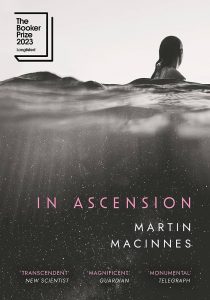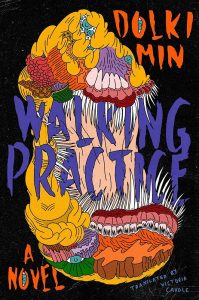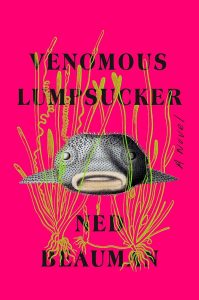The Year in Review 2023 by Niall Harrison

Every once in a while, in defiance of all the cacophony of the actual world, the federated genres of the fantastic can still produce a work whose single novum speaks with a clarity that demands attention. Such a work is Sin Blaché and Helen Macdonald’s Prophet, a highly readable technothriller-romance with two screenplay-ready protagonists, elevated by their investigation into the titular substance. Prophet causes people to experience an irresistible supernormal dose of nostalgia, and more than that, manifests their most private longings into uncanny physical objects. In an early, vivid scene, a man is confronted with an American diner in the middle of a British field, recreatedfrom his childhood memories and tailored precisely to his psychology. Helpless against its pull, he runs inside, and when others remove him he is desperate to return, screaming and clawing at those who restrain him. Eventually he collapses and dies. Autopsy reveals he experienced a sudden, massive surge of stress hormones: takotsubo cardiomyopathy, known colloquially as broken heart syndrome.
The sense is that we would all be vulnerable to prophet; and the potential applications of being able to generate such responses are obvious, numerous, and chilling. ‘‘Nostalgia is emotional and psychological,’’ notes one character, ‘‘but it’s also political. Highly manipulatable.’’ Not for nothing are government agencies and politicians urgently trying to understand the substance: it is after all only an enhancement of what some of them already do. And a similar metastasis of nostalgia – albeit less conspiratorial, more grassroots – can be found in the 2023 winner of the Man Booker International Prize, Georgi Gospodinov’s Time Shelter (2022 trans. Angela Rodel, 2020 in Bulgarian), in which deliberate recreations of environments from individual’s past experiences – such as a particular June evening in 1978 when a son connected with his father over a game of football – are initially intended as a kind of therapy, but become a Europe-wide public obsession, entire countries voting to return to preferred decades of the past.
Both these novels are dashboard lights. They acknowledge the importance of the past and the meaning of loss; but they warn what might happen when the past overmasters us, either through provocation or through avolition for the alternative. And they draw attention to a thread that runs through some of the most compelling recent SF – ofmany kinds – as writers grapple with the global traumas of COVID and climate, and their more local political traumas.
 For an endpoint of the weaponisation of nostalgia, for instance, we can look to Emily Tesh’s Some Desperate Glory. A title taken from Wilfred Owen’s war poetry sets the tone: It is the story of an ardent child raised in the wake of Earth’s destruction by aliens, and her unpeeling of the layers of propaganda surrounding what Earth was, what the aliens are, and what actually happened. Swift and filled with narrative trapdoors, Tesh’s debut novel is also one of the most historically sophisticated space operas of the last decade. Taking another angle, for an attempt to escape from imaginative nostalgia, or at least to harness it productively, we can look to Martin MacInnes’s In Ascension, which throws a classic mysterious alien object into an otherwise pitilessly plausible near future. It, too, is on one level about awareness of history, from the familial to the grandest planetary scale; and it serves as a technical demonstration of how to continue asking big science-fictional questions while starting from the world as it is, rather than as we’d like it to be.
For an endpoint of the weaponisation of nostalgia, for instance, we can look to Emily Tesh’s Some Desperate Glory. A title taken from Wilfred Owen’s war poetry sets the tone: It is the story of an ardent child raised in the wake of Earth’s destruction by aliens, and her unpeeling of the layers of propaganda surrounding what Earth was, what the aliens are, and what actually happened. Swift and filled with narrative trapdoors, Tesh’s debut novel is also one of the most historically sophisticated space operas of the last decade. Taking another angle, for an attempt to escape from imaginative nostalgia, or at least to harness it productively, we can look to Martin MacInnes’s In Ascension, which throws a classic mysterious alien object into an otherwise pitilessly plausible near future. It, too, is on one level about awareness of history, from the familial to the grandest planetary scale; and it serves as a technical demonstration of how to continue asking big science-fictional questions while starting from the world as it is, rather than as we’d like it to be.
 And then we have books that in some way capture the underlying insecurity that makes nostalgia so tempting, and so potent as a weapon. Dolki Min’s Walking Practice (translated by Victoria Caudle, 2022 in Korean) is a short novel told from the point of view of an alien trapped on earth who must kill and eat humans to survive. It reads like a Gen Z version of Michel Faber’s Under the Skin (2000), funny, grotesque, and tender, as the protagonist navigates a desperately atomised mode of living. Han Song’s fantastical Hospital was first published in 2016, but made its way to English this year with revisions during translation (with Michael Berry) that appear to now make it the author’s preferred edition. As its narrator descends into the titular institution, the novel accelerates into pure weirdness, but along the way it satirises the various mechanisms by which individual and social health, in the broadest senses, can be traded off against one another to the detriment of both. Perhaps even more existentially destabilising is Nina Allan’s Conquest, a bricolage novel that forces us to be aware of the choices we make every day as we go around ‘‘reading’’ the world. The novel’s missing-person story is filled with datapoints that can be arranged into science-fictional patterns, but you close the book wondering if declaring the patterns to definitely be there might be walking into a trap. It is one of Allan’s best.
And then we have books that in some way capture the underlying insecurity that makes nostalgia so tempting, and so potent as a weapon. Dolki Min’s Walking Practice (translated by Victoria Caudle, 2022 in Korean) is a short novel told from the point of view of an alien trapped on earth who must kill and eat humans to survive. It reads like a Gen Z version of Michel Faber’s Under the Skin (2000), funny, grotesque, and tender, as the protagonist navigates a desperately atomised mode of living. Han Song’s fantastical Hospital was first published in 2016, but made its way to English this year with revisions during translation (with Michael Berry) that appear to now make it the author’s preferred edition. As its narrator descends into the titular institution, the novel accelerates into pure weirdness, but along the way it satirises the various mechanisms by which individual and social health, in the broadest senses, can be traded off against one another to the detriment of both. Perhaps even more existentially destabilising is Nina Allan’s Conquest, a bricolage novel that forces us to be aware of the choices we make every day as we go around ‘‘reading’’ the world. The novel’s missing-person story is filled with datapoints that can be arranged into science-fictional patterns, but you close the book wondering if declaring the patterns to definitely be there might be walking into a trap. It is one of Allan’s best.
 It might be easy to draw a contrast between this selection of books that appealed to me and, say, this year’s Hugo finalists, characterised in various quarters as ‘‘cosy,’’ which by and large did not; and to cast the latter as the comfort-objects created by prophet, or the time shelters of Gospodinov. But the two tendencies are parallel responses to the world. It’s not a surprise, nor something that should be too strongly critiqued, to find SF’s gestalt looking for works that provide reassurance in unsettling times. You can see the two tendencies in the field’s juried awards, as well: This year the Arthur C. Clarke Award opted for Ned Bauman’s acid satire of the marketisation of environmental politics, Venomous Lumpsucker, while the Ursula K. Le Guin Prize recognised Rebecca Campbell’s condensed generational saga Arboreality, which manages to suggest more or less without dishonesty that since adaptation to a changing climate is inevitable, there will still be good lives to be lived, even if much has been lost. Both books made worthy winners.
It might be easy to draw a contrast between this selection of books that appealed to me and, say, this year’s Hugo finalists, characterised in various quarters as ‘‘cosy,’’ which by and large did not; and to cast the latter as the comfort-objects created by prophet, or the time shelters of Gospodinov. But the two tendencies are parallel responses to the world. It’s not a surprise, nor something that should be too strongly critiqued, to find SF’s gestalt looking for works that provide reassurance in unsettling times. You can see the two tendencies in the field’s juried awards, as well: This year the Arthur C. Clarke Award opted for Ned Bauman’s acid satire of the marketisation of environmental politics, Venomous Lumpsucker, while the Ursula K. Le Guin Prize recognised Rebecca Campbell’s condensed generational saga Arboreality, which manages to suggest more or less without dishonesty that since adaptation to a changing climate is inevitable, there will still be good lives to be lived, even if much has been lost. Both books made worthy winners.
So I wouldn’t want to be taken as being against reassurance on principle: hope, as writers like Rebecca Solnit and Kim Stanley Robinson point out, is a necessary choice. But we mustn’t lose ourselves in the diners of our childhood imaginary, and for me at least, if a 2020s novel is going to provide reassurance, it has to operate beyond the individual level. That can be at the level of a family or small community: Kit Whitfield’s All the Hollow of the Sky is a rich warm folkloric fantasy about different kinds of justice, which feels truthful about what can and can’t be achieved. Tashan Mehta’s Mad Sisters of Esi achieves something similar within a more wildly creative cosmology. Or it could be done at the level of a city, even if an imaginary one: Francis Spufford’s Cahokia Jazz traverses plenty of grim moments as it unspools its tightly wound noir investigation, but its vision of an encouraging alternative city-state being carved out and maintained within and against broader US history is one that lifted my spirits.
Naomi Alderman’s The Future, a novel that, like In Ascension, makes some effort to start from where things stand right now, finds a way to sidestep the apocalyptic crash that most of its characters expect; there are some conveniences along the way, but it is at least an attempt to think differently. Escape routes are delicate things, though, and The Future contrasts for me with Annalee Newitz’s The Terraformers, another breezy novel about the depredations of capitalism (this time with talking animals), but one in which moving the action sixty thousand years into the future makes the final leaps fall a little flat: Why only then, after so long? That leaves the title of the most expansive attempt at imagining the creation of security surely going to Ian McDonald’s Hopeland. It is filled with joyful sentences, imaginative events, and does more to think through ideas about community, and the relationship between community and time in the anthropocene, than any other novel I read this year. It makes a fascinating, and arguably necessary, contrast to Stephen Markley’s exhilaratingly granular The Deluge – the two novels cover almost exactly the same timeframe, but McDonald is concerned entirely with the world beyond America’s borders, Markley entirely with the world within it; McDonald with building new institutions, Markley with whether existing ones can be made to work to address climate change. Put another way, Markley turns the dial more towards the real, while McDonald turns it more towards the inspirational; and in the 2020s we surely need both.
Which is why it feels appropriate to end with Samantha Harvey’s Orbital, since it’s the novel I read in 2023 that married the real and the inspirational most neatly. On the former count, it merely describes a day in the lives of six astronauts aboard the International Space Station as it actually exists. No disasters, no aliens; its only speculative element is a brief mention of an ongoing manned moon mission that in reality has not happened. But in this lies the seed of its inspirational quality: the moon mission is there to make the ISS seem mundane, and in doing so it reminds us not to forget about the actually existing marvel above our heads, and then in turn helps to bring us into the headspace of the astronauts looking back down at the marvel on which we live. Their observations, in Harvey’s hands, are rendered with remarkable freshness, with elegance and no small amount of wonder, but without nostalgia. There is no risk of broken heart syndrome here, no indulging of colonisation dreams, no speculation about bases on the moon or Mars; merely a renewed appreciation of ‘‘this thing that is, given the poor choice of alternatives, so unmistakably home.’’ It’s more than enough to be going on with.
In Niall Harrison’s spare time, he writes reviews and essays about sf. He is a former editor of Vector (2006-2010) and Strange Horizons (2010-2017), as well as a former Arthur C. Clarke Award judge and various other things.
This review and more like it in the February 2024 issue of Locus.
 While you are here, please take a moment to support Locus with a one-time or recurring donation. We rely on reader donations to keep the magazine and site going, and would like to keep the site paywall free, but WE NEED YOUR FINANCIAL SUPPORT to continue quality coverage of the science fiction and fantasy field.
While you are here, please take a moment to support Locus with a one-time or recurring donation. We rely on reader donations to keep the magazine and site going, and would like to keep the site paywall free, but WE NEED YOUR FINANCIAL SUPPORT to continue quality coverage of the science fiction and fantasy field.
©Locus Magazine. Copyrighted material may not be republished without permission of LSFF.







